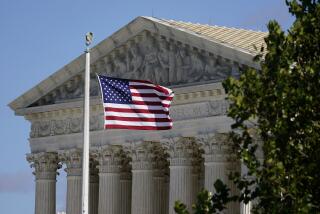Congress Morphs an ‘Itty-Bitty’ Tax Cut Into a Budget Buster
- Share via
For weeks, the president has been criticizing the Senate for embracing an “itty-bitty” tax cut. Now the Senate has done him one better: On Thursday, it passed a tax cut that would probably prove even more costly and less responsible than his own.
The president’s dividend- relief proposal would cost almost $400 billion over the next 10 years. The Senate version, after cynical budget gimmicks are peeled away, could end up costing much more. Instead of ending the “double taxation” of corporate income, the Senate bill threatens to end all taxation of corporate income.
Currently, individuals who invest in corporate stock may be taxed on dividends even though they are paid out of profits that have already been taxed as corporate income -- causing double taxation of the dividends. This double whammy may discourage people from investing in corporations and companies from paying dividends, and may also invite companies to take on too much debt.
For these reasons, the president’s proposal that shareholders’ dividends or capital gains be tax-free if the corporation’s income had already been fully taxed could be a good idea, were it paid for through offsetting tax changes rather than higher deficits. But it’s not.
The House of Representatives’ version is even more flawed.
Its package has virtually nothing to do with double taxation. The House plan would cut taxes on dividends regardless of whether the underlying corporate income had already been taxed. It would also cut tax rates on capital gains and, unlike the president’s proposal, the cuts would take effect regardless of whether such gains were earned on corporate stock or on a piece of land.
Under the House plan, one-third of all dividend relief would go to dividends paid out of tax-free income. Half of the capital gains relief would go to assets other than corporate stock. And because capital gains are much more concentrated among higher earners than dividends, the House approach is even more skewed toward the wealthy than the president’s proposal.
The original Senate proposal featured a more modest change: A flat $500 and up to 20% of any additional dividends received would be tax-free each year. This approach would have helped small investors more than the other options on the table. Offsetting tax increases included some that would have discouraged corporate tax sheltering.
When the Senate plan reached the floor on Thursday, though, it took a dramatic turn without any public debate. Suddenly, all dividends were made totally tax-free for three years starting in 2004. After 2006, the tax cut would ostensibly expire, but in the interim all shareholders could receive unlimited tax-free dividends regardless of whether the company had paid tax.
Accountants and tax lawyers must be drooling in anticipation of the tax-sheltering opportunities. Under this new dispensation, companies could, for example, move income to foreign entities, take the deductions at home and then distribute the profits tax-free to shareholders.
If the Senate bill were enacted, no well-advised billionaire would think of earning income other than through his personally engineered shelter corporation. The IRS would undoubtedly try to stem these shelters, but it is already heavily outgunned by the shelter industry -- and this gaping loophole would finance a lot of new artillery.
Some of the senators voting for the proposal claimed it was fiscally responsible because it would “sunset” at the end of 2006. But there is no reason to believe that after three years of being completely tax-free, dividends would become fully taxed again on Jan. 1, 2007. Far more likely, this “temporary” provision would end up costing much more than the president’s proposal.
Even if Congress did find the courage in three years that it lacks now and let the bill expire as planned, the legislation would still be costly and irresponsible.
It would create incentives for corporations to pay out as much in dividends as possible in 2006 -- even at the expense of their long-run viability. For example, some companies would borrow as much as possible in 2006 so they could pay a giant tax-free dividend in December -- ironic since the policy was originally aimed at reducing corporate indebtedness.
When the House and Senate get together to resolve their differences, they might heed the advice of the first President Bush. His Treasury Department proposed a plan to eliminate double tax without busting the budget.
A plan like that now would provide real relief.
More to Read
Get the L.A. Times Politics newsletter
Deeply reported insights into legislation, politics and policy from Sacramento, Washington and beyond. In your inbox three times per week.
You may occasionally receive promotional content from the Los Angeles Times.










